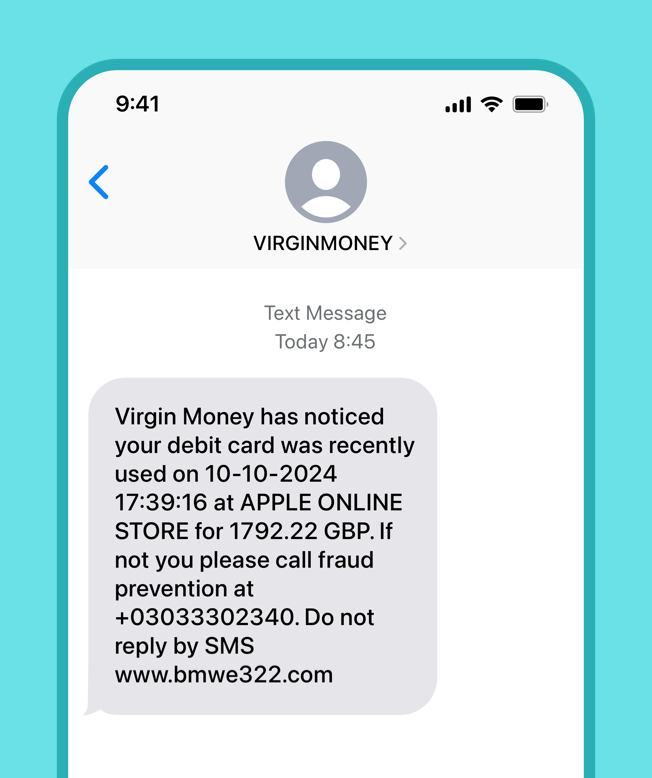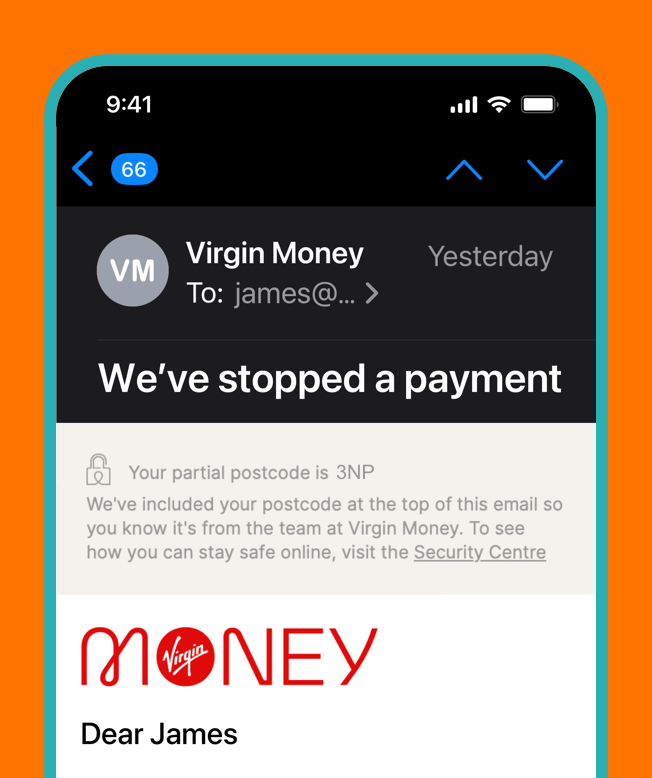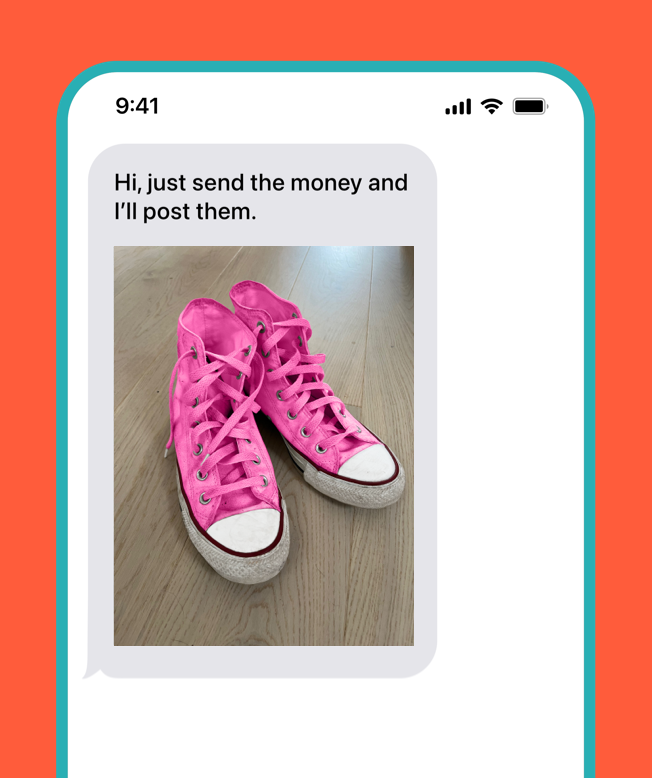Fraud or scam?
Fraud is when someone takes your money without you knowing about it. A scam is when you’re tricked into giving money or your personal details.
Different types of fraud and scams to be aware of
Dodgy messages or calls
Criminals can send an email, message, or call you, pretending to be a genuine person or business. They try and trick you into handing over your personal or banking info.
They are really annoying and come in many forms, including emails (phishing), texts (smishing), phone calls/voicemails (vishing) and QR code phishing (quishing).
Malware
Malware is a malicious software that can damage or disable your phone or computer.
All it takes is to visit an unsafe website, click on an unknown link or attachment, or open an email from an unknown source.
Your personal information can then be sold on or used to threaten you.
Impersonation
Impersonation fraud is very common. Almost half of 18 to 24 year olds have been targeted in an impersonation scam.
Cybercriminals pretend to be someone else like a well-known brand, or even a friend or family member. They want to take your data or money.
WhatsApp scams are becoming more popular. You could get a message from a 'friend' saying they have a new number. They’ll ask you for money and say it's urgent due to an emergency.
Purchase scams
Online and marketplace shopping can be great for a bargain. Watch out for fake adverts selling things that don’t actually exist, like tickets to a concert or the latest tech.
If the price is too good and it’s a one-time special offer, it might be a scam. Never transfer cash to anyone you don’t know. If in doubt, speak to an adult.
Fake friend fraud
Social and gaming channels are great places to chat with people just like you. Most of the time these people are genuine, but we need to be aware of fake profiles trying to make friends with you for all the wrong reasons.
Never share your personal information, arrange to meet them, or send money to someone you’ve never met before.
How to prevent something phishy...
- Always stop, think, and check before you share personal or bank info, or send someone money.
- Stay alert. Ask yourself, "Why have I received this? Was I expecting it? Am I being asked to share confidential information?
- Don’t open or click links in suspicious emails, texts or WhatsApp’s. Block the sender and delete it.
- Don’t share personal details like your address, birthday, or the school that you go to, with anyone.
- Use long passwords, make different ones for each account and keep them to yourself.
- Check out the sender. Is the email address suss? If in doubt always call the number on your debit card.
- We’ll never ask you to move money to a different ‘safe’ account or send you a text or email with a link to enter your details, passwords or any security info.
- Look out for the lock symbol in the address bar when you shop online. This means the site is secure. Don’t see a lock? Don’t make the payment.
What to do if you’ve been scammed
- Speak to a trusted adult. A parent, guardian or teacher is a good place to start.
- Contact us straight away if you think your money is at risk. No judgement, we're always here to help.
- You can also freeze your card immediately in the app.
How scam-savvy are you?
Take our quiz and see if it’s legit or a scam
Question 1 of 5

Ahmed gets this text from Virgin Money about spend on his account. He doesn’t recognise the transaction. There’s a phone number and a link.
Is this legit or phishing?
That’s right!![]()
Did you spot the clues? There’s a phone number and a website address that don’t look legit.
No, it’s phishing!![]()
Did you spot the clues? There’s a phone number and a website address that don’t look legit.

Question 2 of 5

Zara is gaming online. She's asked to download a software plug-in to play another game.
The link is there, should she click on it?
No, it's likely malware ![]()
Opening the link could download malware onto her computer.
That’s right! ![]()
Opening the link could download malware onto her computer.

Question 3 of 5

Virgin Money sent James an email. They’ve put a recent purchase on hold. He didn’t make that purchase. They’ve not asked him to do anything and it’s from an @virginmoney.com email address.
What should he do?
That's right ![]()
If we spot something suss on your account we'll let you know. Sometimes we’ll want to speak with you and other times we'll deal with it in the background.
No, it's legit ![]()
If we spot something suss on your account we'll let you know. Sometimes we’ll want to speak with you and other times we'll deal with it in the background.

Question 4 of 5
![A text message. Sender is: Liz. Message reads: If you send me the money, I can get the train [smiling face emoji]](/img/img_current-accounts-fraud-quiz-question-4.png)
Ben has met someone online. They have so much in common and have been chatting on WhatsApp non-stop for a week. They need some cash to come meet face-to-face as their parents are strict and won’t give them any money.
What should Ben do?
No, it might not be legit ![]()
Be aware of fake profiles trying to make friends with you for all the wrong reasons. Speak to a trusted adult if you're unsure what to do.
That's right! ![]()
Be aware of fake profiles trying to make friends with you for all the wrong reasons. Speak to a trusted adult if you're unsure what to do.
![A text message. Sender is: Liz. Message reads: If you send me the money, I can get the train [smiling face emoji]](/img/img_current-accounts-fraud-quiz-question-4.png)
Question 5 of 5

Ella has found a new pair of kicks on marketplace. She just needs to send the money and they’ll post them. They are so pretty and much cheaper than in the shops!
She's skint, what should she do?
That's right! ![]()
She can’t be sure the seller is genuine - especially when the price is too good to be true. If she really wants them she could suggest they go through a company like Vinted for added protection.
No, it's well dodge ![]()
She can’t be sure the seller is genuine - especially when the price is too good to be true. If she really wants them she could suggest they go through a company like Vinted for added protection.

Your score:
0out of 5
Your score:
0out of 5
